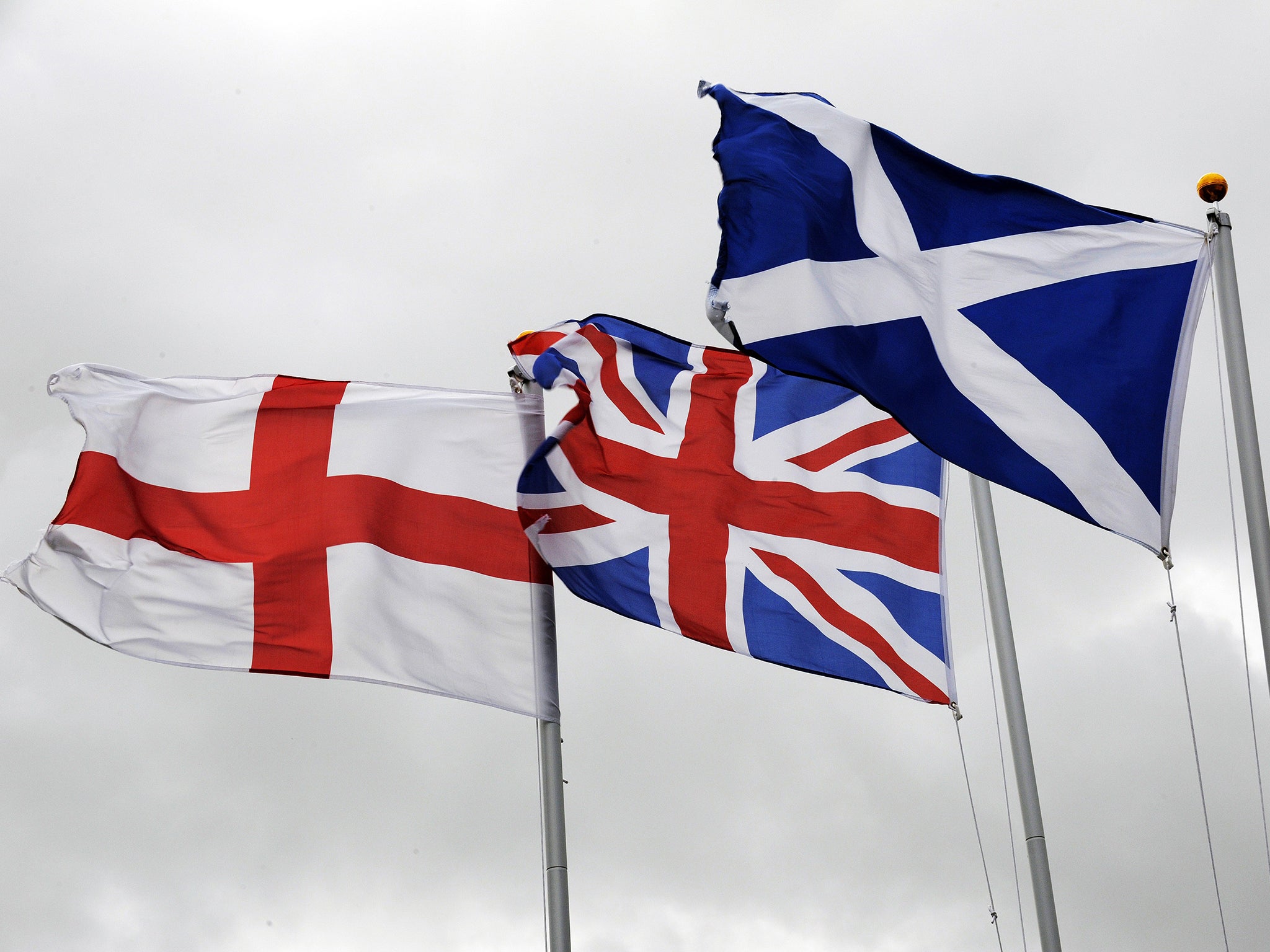Scottish independence: English people overwhelmingly want Scotland to stay in the UK
But if Scotland does break away, the English do not want them to keep the pound

English people’s views on Scottish independence are revealed today by an authoritative study which shows that they profoundly disagree with politicians over what should happen to the UK in the wake of next month’s referendum, regardless of the outcome.
The Future of England Survey found that people south of the border are overwhelmingly against Scotland leaving the UK, with 59 per cent saying they would like the Union to stay intact and only 19 per cent favouring separation.
But it also showed that English opinions over what should take place after the referendum differ widely from the scenarios on which politicians on both sides of the debate are pinning their hopes.
Scotland’s First Minister Alex Salmond has repeatedly insisted that after independence the country would be able to share the pound with the rest of the UK. However, only 23 per cent of those polled agreed with him, with 53 per cent believing that Scotland should not be able to continue using the currency.
There is also only limited English support for the idea that the rest of the UK should support an independent Scotland’s applications to join international bodies such as the EU and Nato, with only 26 per cent agreeing with this statement.
People in England also overwhelmingly reject the Scottish Government’s claim that independence will improve relations between the two countries, with only 10 per cent believing that it will.
However, in a blow to the Better Together campaign, the survey also shows that English people would be in favour of the UK Government taking a much tougher stance on Scotland if it decides to say in the Union.
Most of those polled (56 per cent) agreed that public spending in Scotland should be reduced to the UK average following a No vote, while the vast majority (63 per cent) believe that Scottish MPs should be prevented from voting on English laws in the future.
One of the researchers, Professor Richard Wyn Jones of Cardiff University, said there had been “surprisingly little scrutiny” of what the pro-union parties had promised would happen if Scotland rejected independence.
“The question for Scottish voters is whether they can rely on pledges about the consequences of a No vote, when such pledges do not seem to be supported in the largest and most politically important part of the union,” he said. “The truth of the matter is that the English appear in no mood to be particularly accommodating however the Scots choose to vote in their independence referendum.”
While only residents of Scotland are able to vote on 18 September, the views of the English electorate are still significant as they could increase the pressure on MPs in Westminster to take a tough line on negotiations with an independent Scotland – or reduce the influence of their Scottish colleagues in the case of a No vote.
Another of the researchers, Professor Charlie Jeffery of the University of Edinburgh, said: “It is striking how tough people in England are on Scotland whatever the referendum outcome. There appears to be little appetite for the Scottish Government’s vision of independence amid continuing partnership with the rest of the UK on the pound, Europe and Nato. If anything the message appears to be: ‘Vote Yes by all means, but if you do, you’re on your own’.”
Scottish Labour MSP Jackie Baillie said it was “not surprising” that the majority of people in England did not support a currency union. “For us in Scotland it would mean handing over control of our economy to what would then be a foreign country,” she said.
However, a spokesperson for Yes Scotland said the poll showed Scotland’s budget was “waiting to be slashed” in the event of a No vote. “With less than a month to go, it’s becoming clear that we have only one opportunity to protect Scotland from NHS budget cuts and to rid our country of weapons of mass destruction,” they added.
Pollsters YouGov questioned more than 3,500 English adults for the survey, which was carried out on behalf of Cardiff University and the ESRC Scottish Centre on Constitutional Change, based at the University of Edinburgh.
If Scotland votes Yes…
- “An independent Scotland should be able to continue to use the pound”: 23% agree, 53% disagree
- “The rest of the UK should support Scotland in applying to join international organisations like the EU and Nato”: 26% agree, 36% disagree
- “Relations between England and Scotland will improve”: 10% agree, 53% disagree
- “The UK’s standing in the world will be diminished”: 36% agree, 29% disagree
- “People should be able to travel between England and Scotland without passport checks”: 69% agree, 13% disagree
If Scotland votes No…
- “Levels of public spending in Scotland should be reduced to the levels in the rest of the UK”: 56% agree, 12% disagree
- “Scottish MPs should be prevented on voting on laws that apply only in England”: 62% agree, 12% disagree
- “The Scottish Parliament should be given control over the majority of taxes raised in Scotland”: 42% agree, 25% disagree
- “The Scottish parliament should be given the power to decide its own policies on welfare benefits”: 40% agree, 26% disagree
- “England and Scotland will continue to drift apart”: 37% agree; 21% disagree
Join our commenting forum
Join thought-provoking conversations, follow other Independent readers and see their replies
Comments